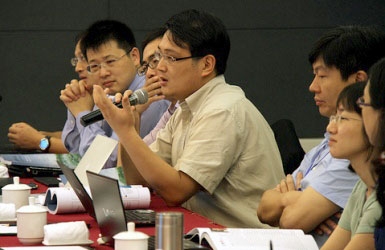Engaging Young Scholars in Health Policy

Young faculty researchers at China’s medical universities are finding health policy and systems sciences can be an effective framework for investigating some of the nation’s most pressing and complicated health challenges. At the first Westlake Summer Youth Forum, held in Hangzhou on August 3-6, 2012, 90 of these rising scholars had opportunities to present their research for peer academic exchange, receive feedback and mentoring from leaders in the field, and discuss shared interests with 16 young overseas Chinese from the China Health Policy and Management Society. The Youth Forum was organized by CMB and Zhejiang University to complement their annual Westlake Forum, which convenes Chinese medical university leaders, researchers, and policymakers to bring greater attention to health policy challenges.
HPSS is an interdisciplinary field that integrates clinical medicine, public health, ethics and politics, economics, evaluation methods, modeling and organizational theory to improve health policies and systems performance. It has become a primary focus of CMB’s support for Chinese medical universities, as it relies on evidence-based approaches to identify priority health problems, craft policies, and improve management and operations of the health care delivery system. Through its grantmaking, CMB has emphasized the importance of engaging the next generation of health professionals in HPSS. Many of the Youth Forum participants were recipients of CMB Open Competition Grants or Seed Grants, or were trainees in the CMB-supported 991 Project.
Program presentations highlighted some of the ways these researchers are applying HPSS to issues such as public health service provision, the mental health of migrant workers, hospital payment reform, environmental epidemiology, and obesity. Their research was critiqued by HPSS specialists, whose professional affiliations illustrate both the range of disciplines that HPSS encompasses and the emergence of this field in China, including: Hu Shanlian ( 胡善联 ), Director of the Shanghai Health Development Research Center and Professor at Fudan University’s School of Public Health; Gordon Liu ( 刘国恩 ), Director of the Peking University China Center for Health Economic Research, Professor at the Peking University Guanghua School of Management, and member of the State Council Health Reform Advisory Commission; Michael Phillips, Director of the Suicide Research and Prevention Center and the Research Methods Consultation Center of the Shanghai Mental Health Center at Shanghai Jiaotong University School of Medicine; and Winnie Yip (叶志敏), Senior Health Economist at the Health Economics Research Centre at Oxford University.
For many participants, the Youth Forum presented a rare opportunity to learn about different projects and experiences of peer researchers of diverse backgrounds. Liu Xiaoyun (刘晓云), a professor at Peking University, commented that “I think the most meaningful exchanges are those among the young colleagues because they all have such different backgrounds." Adam Chen ( 陈茁 ), an overseas Chinese at the U.S. Centers for Disease Control and Prevention, found benefits in sharing ideas and research with his peers in China: “The opportunity to have these kind of exchanges with Chinese friends and teachers is really hard to come by. I also learned about Chinese policy and direction (in the field of HPSS) and some of the scholars’ research.” Professor Wang Liang ( 王亮 ) of the East Tennessee State University expressed his hope that the HPSS community would expand and grow in the future. In catalyzing the interest of China’s next generation of health leaders, the Westlake Summer Youth Forum and other programs can help realize that goal.
